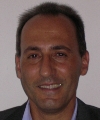Foreword 
Dear Colleague,
We proudly present the Advance Programme of DATE 2019. DATE combines the world’s favourite electronic systems design and test conference with an international exhibition for electronic design, automation and test, from system-level hardware and software implementation right down to integrated circuit design.
Out of a total of 834 paper submissions received, a large share (38%) is coming from authors in Europe, 28% of submissions are from the Americas, 33% from Asia, and 1% from the rest of the world. This distribution demonstrates DATE’s international character, global reach and impact.
For the 22nd successive year, DATE has prepared an exciting technical programme. With the help of 326 members of the Technical Programme Committee who carried out 3276 reviews (mostly four reviews per submission), finally, 202 papers (24%) were selected for regular presentation and 91 additional ones (cumulatively 35%, including all papers) for interactive presentation.
The DATE conference will take place from 25 to 29 March 2019 at the Firenze Fiera in Florence, Italy.
On the first day of the DATE week, five in-depth technical tutorials on the main topics of DATE as well as two hands-on industry tutorials will be given by leading experts in their respective fields. The topics cover Machine Learning for Manufacturing and Test, OpenCL Design Flows for FPGAs, Approximate Computing, Hardware-based Security, and Safety and Security in Automotive, while the hands-on tutorials are on Quantum Computing with IBM Q and Python Productivity for Xilinx Zynq.
During the Opening Ceremony on Tuesday, plenary keynote lectures will be given by Astrid Elbe, Managing Director of Intel Labs Europe, and Jürgen Bortolazzi, Director Driver Assistance Systems and Highly Automated Driving at Porsche. On the same day, the Executive Track offers a series of business panels with executive speakers from companies leading the design and automation industry, discussing hot topics. Furthermore, a talk by Claudio Giorgione, Curator of the Leonardo Department at the National Museum of Science and Technology Milano, will give insight into life and work of Leonardo da Vinci in line with the 500th anniversary of his death, which is celebrated in Florence in 2019.
The main conference programme from Tuesday to Thursday includes 58 technical sessions organized in parallel tracks from the four areas
D – Design Methods & Tools
A – Application Design
T – Test and Dependability
E – Embedded and Cyber-physical Systems
and from several special sessions on Hot Topics, such as Emerging Design Technologies, Design and Test of Secure Systems, IoT Security, Embedded Systems for Deep Learning, Augmented Living and Personalized Healthcare, Robotics and Industry 4.0, as well as results and lessons learned from European projects. Additionally, there are numerous Interactive Presentations which are organised into five IP sessions.
Two Special Days in the programme will focus on areas bringing new challenges to the system design community: Embedded Meets Hyperscale and HPC and Model-Based Design of Intelligent Systems. Each of the Special Days will have a full programme of panels, tutorials and technical presentations and a lunchtime keynote.
Heterogeneous computing with multiple, specialised processors and application-specific accelerators is vital for embedded systems to meet performance, latency, and efficiency targets. The same goals of fast, efficient, and cost-effective processing are also gating factors for the evolution of hyperscale data centre (DC) and high-performance computing (HPC) and Moore’s law no longer provides the necessary efficiency gains. The theme of the special day Embedded Meets Hyperscale and HPC is to showcase this confluence of methods and technologies to better understand, how heterogeneous computing is shaping the future of hyperscale DCs and HPC. A particular highlight of the day will be a keynote given by David Pellerin, Amazon US, on the topic of heterogeneous, high-scale computing in the era of cloud-connected devices.
The special day on Model-Based Design of Intelligent Systems will explore all that is needed to lift model-based design into the era of intelligent systems. Topics addressed are, among others, model-based design frameworks for IoT systems, model-based machine learning, and application of model-based design in safety-critical and autonomous systems. The special day will also emphasise the upcoming challenges in this domain and invite the DATE community to help overcome them. Moreover, as a highlight of the special day, Edward Lee from UC Berkeley will take “A Fundamental Look at Models and Intelligence” in his keynote.
To inform attendees on commercial and design-related topics, there will be a full programme in the Exhibition Theatre, which will combine presentations by exhibiting companies, best-practice reports by industry leaders on their latest design projects and selected conference special sessions. Two of the highlights will be a newly created Publisher’s Session and a career session called Inspiring Futures, giving companies the opportunity to introduce their work and job portfolios.
The conference is complemented by an exhibition, running for three days (Tuesday - Thursday), including exhibition booths from companies, and collaborative research initiatives including EU project presentations. The exhibition provides a unique networking opportunity and is the perfect venue for industries to meet university professors to foster university programme and especially for PhD students to meet future employers.
On Friday, 10 full-day workshops cover several hot topics from areas like (a) Open Source and Machine Learning in EDA, (b) Emerging Techniques for Memories, Interconnections, and Quantum Computing, (c) Hardware Design, Synthesis, and Approximate Computing, as well as EDA in application domains such as (d) Autonomous Systems and IoT. Furthermore, an International F1/10 Autonomous Racing Demo will take place, supported by IEEE CEDA. This is a presentation of open-source, affordable, and high-performance 1/10 scale autonomous vehicles.
For further information, please visit: www.date-conference.com
We wish you an exciting and memorable DATE 2019, a successful exhibition visit and an entertaining DATE party on Wednesday evening.
 |
DATE 2019 General Chair Jürgen Teich Friedrich-Alexander-Universität Erlangen-Nürnberg (FAU), DE |
 |
DATE 2019 Programme Chair Franco Fummi University of Verona, IT |
